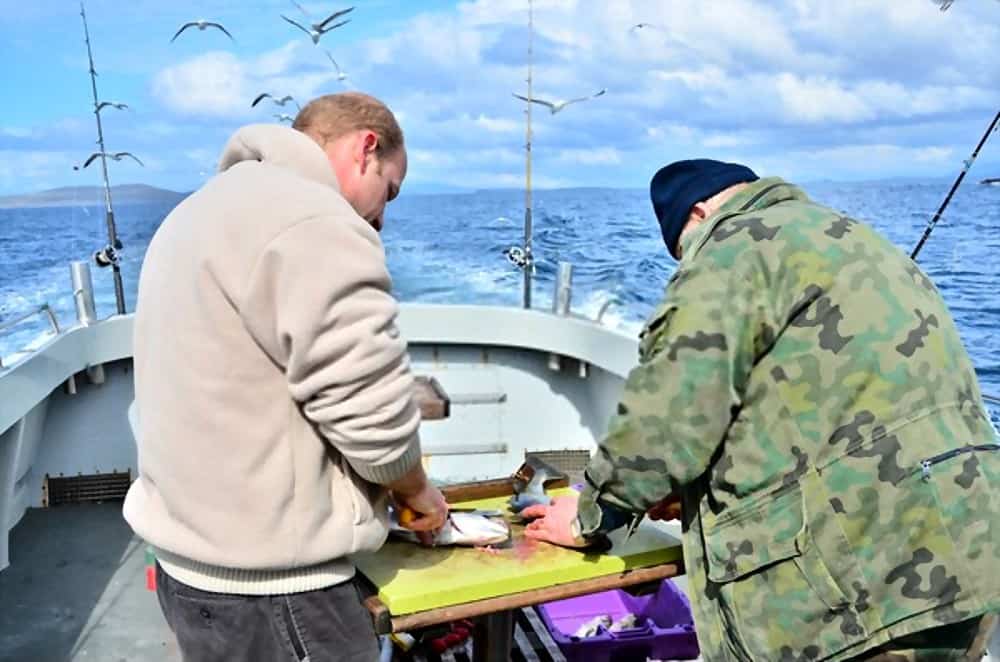So you caught fish – congrats!
Now the question is – can you freeze fish whole without cleaning them? Or is it a bad idea to do so?
If you are at a loss on what you need to do about this freshly-caught fish, let us look into how professionals handle it. We share with you these key tips and tricks that will help you to ensure the quality of that fish you have caught and the right way to deal with it.
Contents
Poor Handling Can Be a Big Problem
The freezing of fish is a common practice commercially. But not many people are aware of how to best go about it when they catch fish and hope to keep it fresh until they bring it home.
Keep in mind that fish that are frozen whole tend to be in lower quality because of poor practices in handling, as well as in processing. Always remember that it is your responsibility to ensure the quality of the fish you have caught as this can impact your health and those who will consume this wild catch.
Correct Practices When Freezing Fish
Once you have caught the fish, you need to prevent it from just lying around on the net. If you leave it on the net, it is most likely to get crushed. Worst case scenario, it will rapidly spoil, which renders it a waste.
The next thing you should do after catching fish is to gut it. Expert anglers recommend that fish need to be washed, bled, and cleaned well before you place them in the freezer. It is highly important that you keep the fish cool the whole time to prevent it from spoiling.
Before you gut the fish, avoid sliding it way too much. This action causes damages to the fish, especially if it rubs up against other fish species with rougher skin. You may want to use dividers to prevent the fish from moving excessively, particularly during rough weather conditions.
It is very important to remember that newly caught fish must be kept separated from older ones. Mixing them up will only impact the quality of the fish you have just caught. You need to gut and clean the older ones and put them in separate storage instead.
What to Do with Ungutted Fish
If you are unable to gut the fish, make it a point to keep it cool at all times. You will need to use ice to do so. But if there is no ice available, another option is to soak the fish in cold water. Use this chilled water to keep the fish nice and cool before you are ready to clean it.
Another practical option is to hose the dish down. Sometimes, hosing will suffice, particularly if the water temperature is under 5 degrees Celsius.
But a rule of thumb when it comes to keeping fish fresh is to never keep it waiting in storage for a long time. It is very essential to gut it straight away once caught. The chances of the fish spoiling are quite high when you just store it for hours without gutting and freezing it.
Once it has spoiled, you cannot bleed it properly. This is typical when it has been stored in a warm location, which is not the most favorable place for you to keep it.
In fact, it is not advisable to keep fish longer than 6 hours without gutting it. This makes it questionable to eat, as spoilage may have occurred by then.
Read More: How to Keep Fish Fresh Without Ice: The Common Tips to Follow
Important Tips about Gutting Fish Properly

Why do you need to gut the fish caught right away?
You need to gut fish immediately after being caught to make sure they bleed appropriately. Those that are not bled thoroughly end up looking unattractive and discolored, which is why it is important to gut them as quickly as possible.
Gutting is a very important technique that every angler should do and learn. It is not very easy for those who have no experience doing so, which is why it requires practice to do it the correct way.
But more than the aesthetics, sanitation, and quality are crucial factors that impact a delay in gutting fish. Bits of the liver and other interior portions of the fish that are left hanging in their belly can cause spoilage. You need to cut the napes to quickly wash and bleed the fish, which also keeps it looking fresh and valuable.
What can you do with the guts taken out of the fish?
You need to throw them away and never to put these on top of ungutted fish. The juices flowing out of the guts will soften the skin of the fish, which can impact their appearance. Make sure that you place the guts as further away as possible from the other fish.
Another very important thing to take note of is that you need to check for worms in fish.
Be sure to check the livers of fish for any signs of worm infestation. It is highly possible that if you see worms in the liver, the flesh is likely to be contaminated, as well. The black portion of the flaps on the belly also needs to be free from worms. If you see one, you need to cut it open and check it out.
After Gutting The Fish – Additional Tips
Wash the fish very well and remove as much slime and gut as possible. Bacteria in these portions will only cause the fish to smell and spoil.
When freezing, be sure to do it as thoroughly as possible. The freezing time has to be just right. It also needs to be the perfect temperature, which is -40 degrees Celsius. If it is warmer, this may affect the overall quality and freshness of the fish, which will then negatively impact the health of those who will consume it.
For more tips on storing fish the right way, here is a video you may want to check out:




